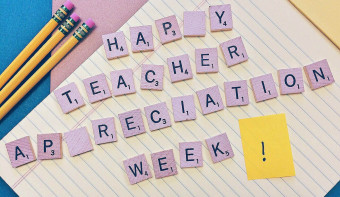About Punctuation Day
Every year on September 24, grammar enthusiasts, writers, and educators alike unite to celebrate National Punctuation Day—an event dedicated to honoring the small but mighty symbols that give structure and clarity to our language. Founded in 2004 by Jeff Rubin, National Punctuation Day promotes the importance of correct punctuation usage, reminding us how crucial punctuation marks are in clear communication.
People everywhere can celebrate this day by improving their writing with effective punctuation.
September 24th is a celebration of the lowly comma, the correctly used quotation mark, and other proper uses of semicolons, and the ever-mysterious ellipsis - period. And periods.
Did you know? The ampersand symbol used to be included in the alphabet, listed after the letter “z.” It was even part of the beloved alphabet song of the time, with the ending being “z and per se.”.
Did you know? The question mark used to be a word. The Romans would end a question with the word “questio,” which was gradually shortened over time and eventually morphed into the symbol we know today.
The Origins of National Punctuation Day
Jeff Rubin, a writer and newsletter publisher, created National Punctuation Day out of his love for the written word and his desire to combat the growing neglect of punctuation in everyday writing. From emails to advertisements, Rubin noticed an increasing disregard for proper punctuation, and he wanted to encourage both children and adults to pay more attention to how they express themselves. His goal? To spread awareness about how punctuation impacts the way we understand language and, ultimately, how it helps convey meaning more accurately.
Over time, what started as a small, grassroots effort has grown into a national observance, celebrated in schools, businesses, and homes across the United States. Rubin's website for the day features contests, tips, and resources aimed at helping people sharpen their punctuation skills, making grammar lessons fun and accessible.
Why Punctuation Matters
At first glance, punctuation marks may seem like minor elements of writing. However, these tiny symbols are essential to effective communication. Punctuation helps to organize thoughts, clarify meaning, and establish tone in written language. Consider how different a sentence can sound depending on its punctuation:
Let's eat, Grandma!
Let's eat Grandma!
In the first example, punctuation creates a clear distinction between inviting Grandma to eat and suggesting a more alarming course of action in the second example. Commas, periods, question marks, and other punctuation marks act as guideposts that tell readers how to interpret words and phrases.
Beyond individual sentences, punctuation also shapes the rhythm and flow of longer texts, enhancing readability. Without these tools, writing can become confusing, disjointed, and difficult to follow.
Common Punctuation Marks and Their Uses
While there are many punctuation marks, a few stand out as essential to everyday writing:
Comma (,): Used to separate ideas, items in a list, or clauses, commas prevent confusion by creating pauses that clarify meaning.
Period (.): The most common punctuation mark, periods signal the end of a complete thought or sentence.
Question Mark (?): This symbol is used to indicate a direct question, signaling a need for a response or reflection.
Exclamation Mark (!): Exclamation marks express excitement, emphasis, or strong emotion. They should be used sparingly to avoid over-dramatizing text.
Semicolon (;): Semicolons link closely related independent clauses or separate items in complex lists, offering a middle ground between periods and commas.
Apostrophe (’): Apostrophes are used for contractions and to show possession.
Quotation Marks (" "): These marks indicate spoken or quoted text, providing clarity on where direct speech or cited material begins and ends.
Colon (:): Colons introduce lists, explanations, or quotations, and are often used to connect related ideas.

Punctation through the Ages
The earliest record of using punctuation in writing dates back to 840 B.C. in the Mesha Stele, which contains an inscription in the name of King Mesha of Moab.
Later on, in 200 B.C., the Greeks began using a rudimentary punctuation system to indicate pauses in lines of text.
When copies of the Bible were printed in large quantities, punctuation became crucial so its readers would know when to pause and where to place emphasis.
From then on, the use of punctuation became widespread.
How to Celebrate National Punctuation Day
Whether you're a seasoned writer or someone looking to improve your grammar, National Punctuation Day offers a great opportunity to brush up on your punctuation skills. Here are a few fun ways to observe the day:
Take a Punctuation Quiz: Test your knowledge of punctuation rules by taking an online quiz. Many websites and educational resources offer fun and challenging punctuation tests.
Punctuation Scavenger Hunt: Look for punctuation errors in everyday contexts—on signs, in emails, or even in advertisements. Spotting and correcting these errors can be a fun challenge.
Write a Letter: Send a handwritten or typed letter to a friend, paying extra attention to your punctuation. It's a great way to practice your skills and celebrate the art of writing.
Teach Others: If you're passionate about punctuation, take the time to teach someone else about it. Share tips with your children, classmates, or coworkers to help spread awareness.
Cook a Themed Recipe: For those who love a creative challenge, Jeff Rubin suggests baking a batch of cookies shaped like punctuation marks. It's a fun, hands-on way to recognize the day's significance.
National Punctuation Day may seem like a quirky holiday, but it serves a valuable purpose. In a world where communication is more fast-paced than ever, and shorthand writing styles often dominate our digital exchanges, punctuation remains a key tool in making our messages clear and effective. By celebrating this day, we recognize the enduring importance of punctuation and how it shapes our language, ensuring that we continue to communicate thoughtfully and with precision.
So, on September 24, take a moment to appreciate the periods, commas, and semicolons that help us express our thoughts clearly—and maybe, just maybe, correct that dangling comma in your last email!
Find out moreSimilar Observances
National Kindergarten Day
Read More
National Teacher Appreciation Day 👩🏫
Read More
National Provider Appreciation Day
Read More
Other Observances on September 24th 2025
Schwenkfelder Thanksgiving
Read More










